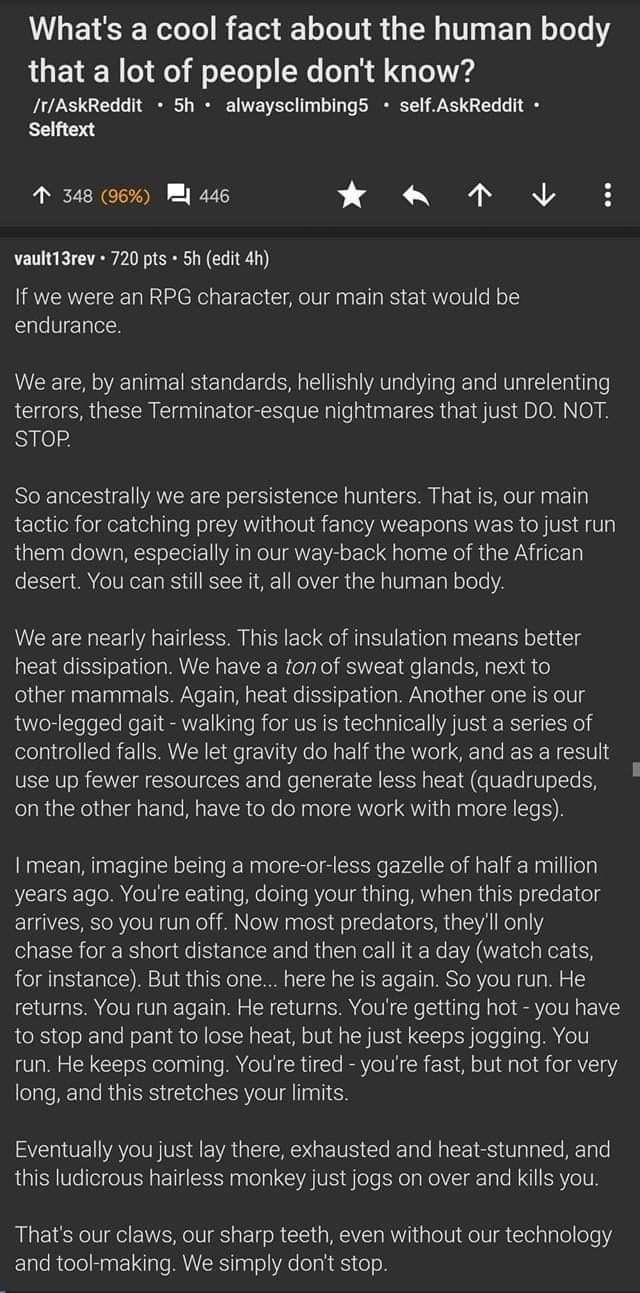Human Evolution - Tumblr Posts
Reminders of the fact we are biological creatures can make people uncomfortable, as if it makes us less real and our choices less genuine, but I think we can chose to embrace it, too. The way music will increase our sadness at something. The way early mornings in spring make you feel everything will be okay, despite logic. The warmth and peace we feel when being hugged. We’re biological, and that’s okay. It’s beautiful that we’re the result of billions of years of change. I still believe we’re more than our bodies, more than biology. But we can embrace both. We are infinitely complex.
I am so sad about the extinction of Neanderthals! I am inconsolable! I just can't help thinking about how similar they were to us and how they possibly had community care, tending to indivuals who weren't "useful." Maybe it is more than human to care. Maybe we were cursed to be alone on this earth.

日本の考古学と科学思想の歴史。 第3章 : 日本の考古学者の皆さん、哲学的観点から見た新しい日本考古学へようこそ。 - 1868年当時、日本にはヨーロッパやアメリカで見られるような科学的根拠はありませんでした。日本がその精神やその一部を開放したのは、1868年から1869年の戊辰戦争後になります。米国のような国は日本の科学をモデルにするだろうから、非常に保守的だった。 日本で骨董品への関心が芽生えたのはいつ頃ですか? 江戸時代にはすでに骨董品への関心があったことが知られており、はるか昔にヨーロッパでも同様のことが起こりました。 日本の発掘の始まりは19世紀のほぼ終わりに始まり、数年前に日本でいくつかのローマ硬貨が発見されました。どうやら日本の封建領主は古遺物を収集するのが好きでした。おそらくそれらは中国のどこかの港から海岸に到着しました。日本語。 - 過去を知りたいという欲求は、どの大陸に属していても、すべての人類に共通のものであり、問題の時代についても同じことが言えます。 ヨーロッパやアメリカの様々な勢力が日本に到来したとき、彼らはその住民に影響を与えました。そのため、日本人によって日本考古学の父と考えられているエドワード・モースを、他の登場人物の中でも特に取り上げています。 19 世紀には、アメリカ哲学の最も偉大な学派の 1 つであるテイラー主義があり、これは台湾で考古学的発掘を行い、中国および韓国との関係を確立する日本の考古学の最も偉大な人物の 1 人である鳥居龍蔵に影響を与えることになります。 - 気に入っていただければ幸いです。今後の投稿でお会いしましょう。良い一週間をお過ごしください。 - HISTORY OF JAPANESE ARCHEOLOGY AND SCIENTIFIC THOUGHT. Chapter 3 : Welcome, Japanesearchaeologicalists, to a new installment of Japanese archaeology, seen from a philosophical point of view. Having said that, get comfortable and let's begin. - In 1868 Japan did not have a scientific base per se as we can see in Europe or the United States, it will be after the Boshin War of 1868-69 when Japan opened its mentality or part of it, since a good part of the population was very conservative because Countries like the United States would model Japanese sciences. When did interest in antiques arise in Japan? It is known that in the Edo period there was already interest in antiquities, something similar happened in Europe a long time ago. The beginning of the Japanese excavations began almost at the end of the 19th century, a few years ago some Roman coins were discovered in Japan, apparently a feudal lord in Japan liked to collect antiquities, they probably arrived from some port in China to the coasts Japanese. - The desire to know the past is something that all human beings share, no matter what continent you belong to and the same can be said about the era in question. When the different powers from Europe and the United States arrived in Japan, they influenced its inhabitants, thus we have, among other characters, Edward Morse, considered by the Japanese, the father of Japanese archaeology. During the 19th century we have one of the greatest schools of American philosophy, Taylorism, which will influence one of the greatest figures of Japanese archeology Torii Ryūzō who will carry out archaeological excavations in Taiwan, establishing relations with China and Korea. - I hope you liked it and see you in future posts, have a good week.
I have been reading about the history of landscape architecture and apparently there was this theory that humans have an inherent, innate preference for "savanna-like" open grassy environments with scattered trees due to our evolutionary past, with the reasoning that open grassy understories allow us to see predators coming. And for some reason everyone just accepted it as the truth for decades.
And then this lady Margaret Grose in a book called Constructed Ecologies is like "wait, why did we accept this as the truth for decades? How do we know this is innate and not a cultural preference ingrained by European style landscaping? Did the human species actually evolve in mostly savanna-type landscapes, or did we just randomly decide that because we associate Africa with savannas? Throughout millions of years of recent evolutionary history we've been in a shit ton of different environments because there were a bunch of ice ages. Also African savanna grasses get like 4 meters tall and predators can hide just fine in that."
and it's like wow when you put it that way it's kinda stupid that people decided this idea was true for no reason
~
A letter from a female to a male upon realizing they were left behind when their clan migrated (a poem I wrote earlier, but I thought would be funny in this context)
Neanderthals are dead.
Denisovans are too.
You're the only one left,
So I guess you'll do.

Sure, she’s a little weird looking. But after a few dozen fermented berries, you won’t care (Neanderthal woman reconstruction and photo by University of Zurich).
A paper published in Cell this week describes the results of whole-genome sequencing for five Africans from three hunter/gatherer tribes. The paper reports the discovery of “ancient DNA” sequences in all five Africans. The sequences are previously unknown in modern humans, including other modern Africans, and although the sequences are similar neither to modern humans nor to other human populations — such as Neanderthals — the paper’s authors say the DNA sequences most closely resemble Neanderthals.
One of the paper coauthors, U-Dub genomicist Joshua Akey, told the Washington Post that this was evidence a “sister species” of Neanderthals once roamed Africa (weird because Neanderthals are believed to have originated in Europe and their bones have never been found anywhere in Africa, and Neanderthals were not a species).
It’s not impossible that the gist of what Akey is saying is true — that some population of ancient Europeans went south into Africa and bred with local populations — but the evidence he and his colleagues present is not strong enough to support that claim.
I also disagree with the scientists calling the human source of these ancient DNA sequences a “sister species” of Neanderthals. That suggests the population from which these sequences came were European in origin. We don’t know that.
The New York Times article about the Cell paper is better.
At stake here is how modern humans came into being.
The old idea is that our ancestors originated in Africa, then migrated and replaced populations of human-like (but nonhuman) species wherever they ended up.
The newer, more accepted idea is that new humans (who originated in Africa) actually interbred with older humans wherever they went, and this melding of genes helped produce the world’s many unique groups of modern humans.
Despite what the Post and Times articles suggest, Neanderthals were not a separate species — they were human. And so too could the genetic sequences found in these Africans have come from another group of early humans, perhaps endemic to Africa, as yet unnamed, and roaming through and amidst populations of more modern humans, occasionally interbreeding and mixing new genes with old, old genes with new. Gene flow works both ways, after all.
“No homo” I whisper, filled with bewilderment. Indeed, there are only Australopithecine around. It’s the Pleistocene epoch.
Reminds me of bio 1011. Photosynthesis is fucked up too. Tl;dr: evolution takes the quickest, easiest, and metabolically cheapest solution to a problem, not the best one. and we have to deal with the side effects.

life is back pain
Oh I can probably answer this!! I love spec-evo!
the simple answer (i.e. columnar vertical bipedal build) is that our spines would probably be much more straight vertical and likely a bit more rigid. I’d imagine our pelvis and lower legs would be considerably more reinforced, and the arches of our feet would probably be nonexistent.
however, a more interesting route would be a convergent bauplan to theropods (i.e. balanced-fulcrum horizontal bipedal build)... imagine a human but with the spine aligned roughly parallel to the ground and a long, stiff tail like coelurian theropods. freaky, right? but hey, much less stress on the spine!
hey yknow how the human lower back sucks caus it hasnt had time to adapt yet to walking on two feet rather than all fours? how would our back look if it was made for walking on two legs would it be shorter, taller, wider, would we have more supportive bones between the ribcage and pelvis, how the fuck would we look
rb this with ur opinion on this shade of pink:


@paperandpencilsandskips eye contact is not a naturally friendly gesture! it’s well-documented that eye contact is actually a threat in primate behavior, so you’re actually in the right if you hate eye contact. humans, especially “western” civilization, have warped this part of facial language (as well as smiling, also ancestrally hostile) for some reason into expectations of respect and attentiveness.
Pros of having ADHD:
Can track prey for hours without losing focus
Special interest: basket weaving
Always fidgeting - banging rocks together and discovers flint-knabbing
Distracted by berries
Stimming by making noises, discovers the sksksk that lures out squirrels
Can't sleep at night, great at guarding the cave while family sleeps
Sensitive senses means discovering and refusing to eat rotten/poisonous food
Sees bird eat nut - impulsively tries it too and discovers that nuts taste good
Cons of having ADHD:
Can't do homework
Impulse buys
Can't use a calendar
Can't sit still in classroom
I should also point out that humans are incredibly resistant to impact damage and able to naturally heal from injuries that would kill most other mammals, broken limbs in particular. part of this is, of course, because of our elevated sense of community, which drives us to care for other humans (and organisms in general) that can’t care for themselves, but the other part of it is just that we’re freakishly good at fixing ourselves.

Human vs Animals
'the human body is perfect god doesnt make mistakes' what about wisdom teeth then. huh. gonna let those bastards grow in and fuck up your jaw for god. didnt think so

